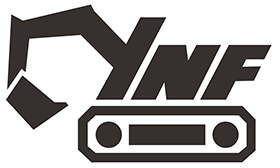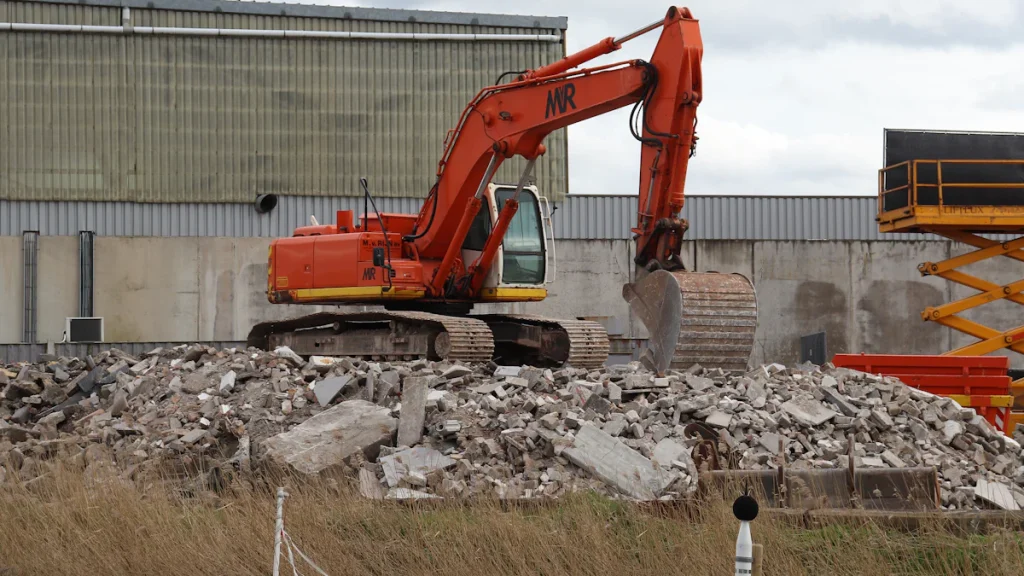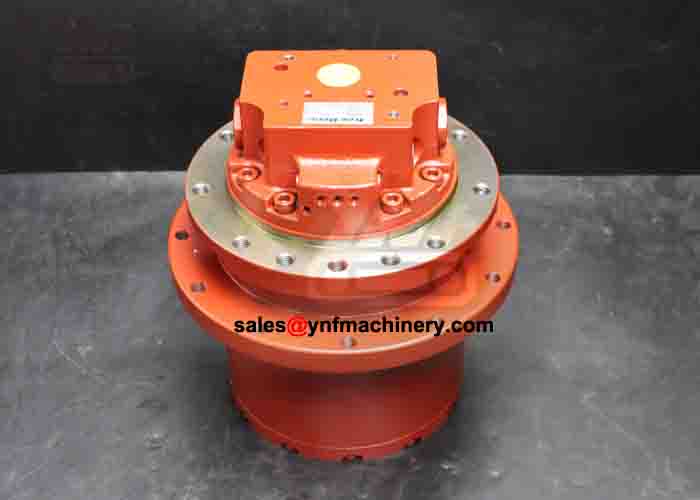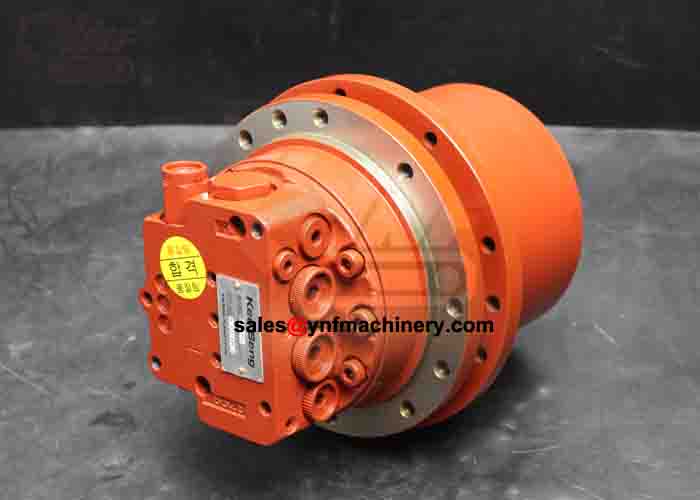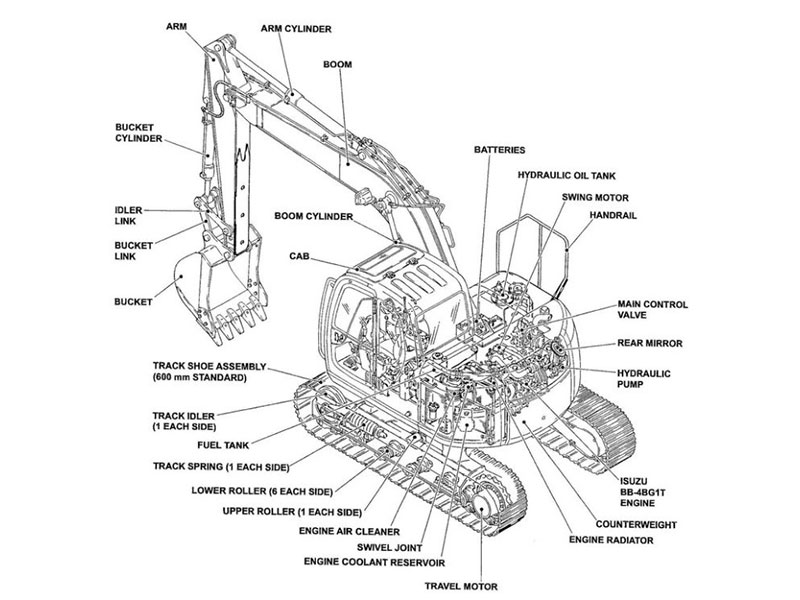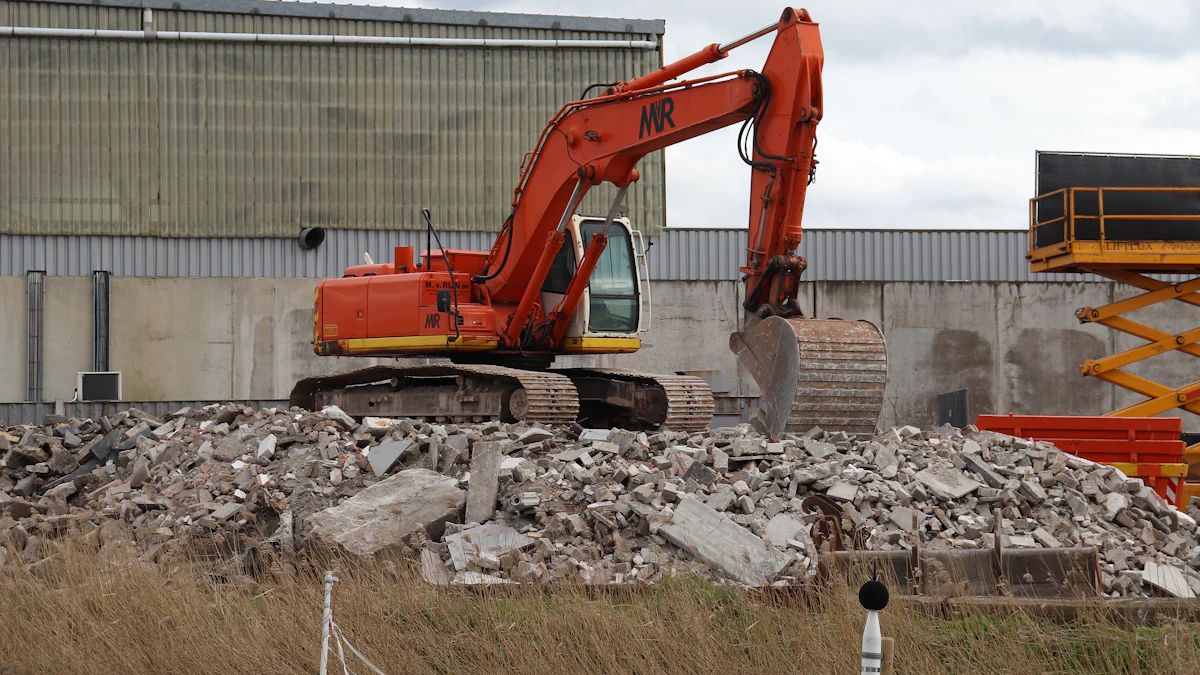
The crawler hydraulic excavator relies on its hydraulic systems to deliver unmatched power and precision. These systems consist of key components like the hydraulic pump, cylinders, control valves, hoses, and reservoirs. Each part plays a vital role in ensuring smooth and efficient operation. For instance, the hydraulic pump generates the pressure needed to move the machine, while the cylinders provide immense force for heavy-duty tasks. Regular maintenance of excavator hydraulic parts, such as keeping oil clean and replacing filters, ensures optimal performance. Understanding these excavator parts helps you maintain productivity and reduce downtime.
Key Takeaways
The hydraulic pump is the heart of the excavator’s hydraulic system, generating the pressure needed for all operations.
Regular maintenance of hydraulic components, including pumps, cylinders, and hoses, is crucial for optimal performance and longevity.
Understanding the different types of hydraulic pumps and cylinders helps in selecting the right components for specific tasks.
Control valves are essential for directing hydraulic fluid flow, ensuring precise movements and efficient operation.
High-quality hydraulic hoses and seals prevent leaks and contamination, maintaining system integrity and performance. Using reliable parts from trusted suppliers like YNF Machinery enhances the durability and efficiency of your excavator’s hydraulic system. Proactive troubleshooting and regular inspections can prevent minor issues from escalating into costly repairs.
Hydraulic Pump: The Heart of the Excavator Hydraulic System
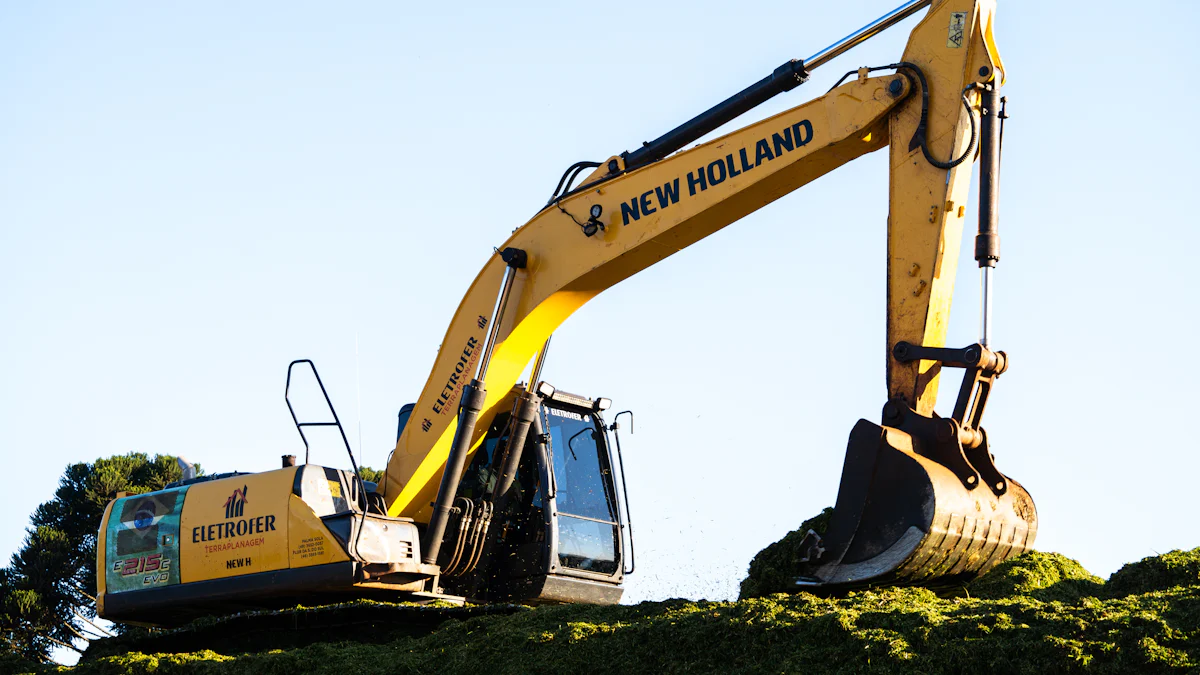
The hydraulic pump serves as the powerhouse of the excavator hydraulic system. It generates the pressure required to move hydraulic fluid, enabling the machine to perform its tasks with precision and power. Without this critical component, the entire system would fail to function. The pump ensures that hydraulic energy is efficiently converted into mechanical energy, powering the excavator’s movements and operations.
Function and Importance of Hydraulic Pumps
The hydraulic pump plays a vital role in the excavator’s performance. It pressurizes the hydraulic fluid, which then flows through the system to activate other components like cylinders and control valves. This process allows the excavator to lift heavy loads, dig trenches, and perform other demanding tasks. A well-functioning pump ensures smooth operation, reduces energy loss, and enhances the overall efficiency of the machine.
“The hydraulic pump is the heart of the excavator hydraulic system, driving the flow of energy that powers every movement.”
Regular maintenance of the pump is essential. Checking for leaks, monitoring pressure levels, and replacing worn-out parts can prevent costly breakdowns. By keeping the pump in optimal condition, you ensure the longevity and reliability of your excavator.
Types of Hydraulic Pumps in Excavators
Excavators use different types of hydraulic pumps, each designed for specific applications:
Gear Pumps: Known for their simplicity and efficiency, gear pumps are commonly used in smaller excavators. They are cost-effective and easy to maintain, making them a popular choice for basic operations.
Piston Pumps: These pumps excel in high-pressure environments. Their superior performance makes them ideal for heavy-duty excavators. Piston pumps handle intense workloads with unmatched precision and durability.
Vane Pumps: Offering a moderate operating range, vane pumps provide a balance between performance and pressure. They are suitable for medium-sized excavators and applications requiring consistent output.
Each type of pump has unique features that cater to different operational needs. For instance, piston pumps are often preferred for their ability to withstand high-pressure conditions, ensuring reliable performance in demanding tasks.
YNF Machinery’s Role in Providing Reliable Excavator Hydraulic Parts
When it comes to sourcing high-quality hydraulic pumps, YNF Machinery stands out as a trusted partner. With over 35 years of experience, YNF Machinery offers a wide range of reliable parts tailored to meet the needs of various excavator models. Their selection includes gear pumps, piston pumps, and vane pumps, ensuring compatibility with different systems.
YNF Machinery prioritizes quality and durability. Their hydraulic pumps undergo rigorous testing to meet international standards, guaranteeing long-lasting performance. By choosing YNF Machinery, you gain access to premium products that enhance the efficiency and lifespan of your excavator.
“YNF Machinery simplifies the process of finding reliable hydraulic pumps, ensuring your excavator operates at peak performance.”
In addition to providing top-notch products, YNF Machinery offers excellent customer support. Their team assists you in selecting the right pump for your excavator, ensuring a seamless purchasing experience. With competitive pricing and fast delivery, YNF Machinery helps you maintain productivity without breaking the bank.
Hydraulic Cylinders: Converting Hydraulic Energy into Motion
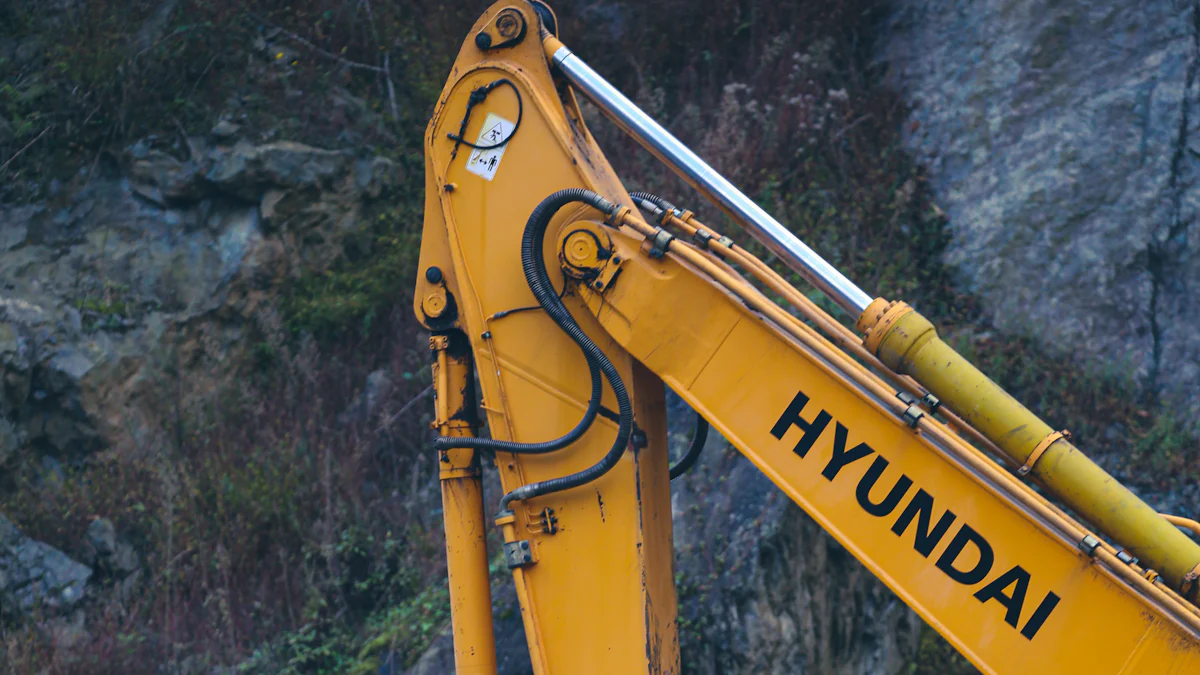
Hydraulic cylinders are among the key components that enable excavators to perform heavy-duty tasks with precision and efficiency. These cylinders convert hydraulic energy into motion, allowing the excavator to lift, push, and move materials with ease.
How Hydraulic Cylinders Work in Excavator Hydraulic Systems
Hydraulic cylinders operate by using pressurized hydraulic fluid to create force. When the hydraulic pump generates pressure, the fluid flows into the cylinder, pushing the piston rod outward. This movement translates hydraulic energy into mechanical force, enabling the excavator to perform tasks such as lifting heavy loads or extending its arm.
The efficiency of hydraulic cylinders depends on maintaining proper pressure levels. High pressure ensures precise and forceful movements, while low pressure can lead to reduced output and inefficiency. Regular inspection of the hydraulic system helps maintain optimal pressure, ensuring that your excavator operates at its best.
“Hydraulic cylinders transform hydraulic force into motion, making them essential for the lifting capacity and versatility of excavators.”
Types of Hydraulic Cylinders and Their Applications
Excavators use various types of hydraulic cylinders, each designed for specific functions. Understanding these types helps you choose the right cylinder for your machine:
Boom Cylinders: These provide the force needed to raise and lower the excavator’s boom, enabling it to reach different heights.
Arm Cylinders: These control the movement of the excavator’s arm, allowing it to extend or retract during operations.
Bucket Cylinders: These are responsible for the precise movement of the bucket, enabling tasks like scooping, digging, and dumping.
Tilt Cylinders: These adjust the angle of the bucket or other attachments, offering greater flexibility in operations.
Each type of hydraulic cylinder plays a unique role in enhancing the excavator’s maximum lifting capabilities. For instance, boom cylinders handle the heavy lifting, while bucket cylinders ensure precision in material handling.
The Role of Hydraulic Cylinder Seal Kits in Preventing Leaks
Seal kits are critical for maintaining the performance and longevity of hydraulic cylinders. These kits prevent hydraulic fluid from leaking, ensuring that the system operates efficiently. A well-sealed hydraulic cylinder not only enhances lifting capacity but also reduces the risk of contamination and wear.
High-quality seal kits, like those offered by YNF Machinery, are designed to withstand shocks, vibrations, and extreme conditions. They provide a tight grip between metal components, ensuring smooth operation and preventing costly downtime. Regularly replacing worn-out seals helps maintain the reliability of your excavator’s hydraulic system.
“Investing in durable seal kits ensures that hydraulic cylinders perform at their peak, minimizing leaks and maximizing efficiency.”
By understanding how hydraulic cylinders work and maintaining them properly, you can ensure that your excavator delivers consistent performance. Whether you’re lifting heavy materials or performing precise tasks, these components are vital for achieving optimal results.
Control Valves: The Brain of the Hydraulic System
Control valves play a pivotal role in excavator hydraulic systems. They act as the decision-makers, directing the flow of hydraulic fluid to various components. Without them, the system would lack precision and efficiency. These valves ensure that hydraulic pressure is distributed accurately, enabling the excavator to perform tasks like lifting, digging, and rotating with ease.
Function of Control Valves in Excavator Hydraulic Systems
Control valves regulate the allocation and rate of pressurized fluid delivery within the hydraulic system. They determine how much hydraulic pressure reaches specific components, such as cylinders or motors. This regulation allows you to control the speed, force, and direction of the excavator’s movements.
For example, when you operate the joystick, the main control valve adjusts the flow of hydraulic fluid to the desired component. This action enables precise movements, whether you’re extending the arm or tilting the bucket. Properly functioning control valves ensure smooth operation and prevent unnecessary wear on other hydraulic parts.
“Control valves are essential for the proper functioning of excavator hydraulic systems, ensuring accurate fluid distribution and efficient energy transfer.”
Types of Control Valves and Their Applications
Excavators use various types of control valves, each designed for specific tasks. Understanding these types helps you optimize your machine’s performance:
Directional Control Valves: These valves direct the flow of hydraulic fluid to specific components. They are crucial for controlling the movement of the excavator’s arm, boom, and bucket.
Flow Control Valves: These regulate the speed of hydraulic motors or cylinders. By adjusting the flow rate, they allow you to control the pace of operations, such as digging or lifting.
Pressure Control Valves: These maintain safe hydraulic pressure levels within the system. They protect components from damage caused by excessive pressure.
Each type of valve contributes to the overall efficiency of the hydraulic system. For instance, flow control valves help you achieve consistent performance by regulating the energy transfer rate at any point in the system.
Importance of Proper Calibration for Optimal Performance
Proper calibration of control valves is vital for maintaining the efficiency and longevity of your excavator. Incorrect settings can lead to uneven fluid distribution, reduced performance, and increased wear on hydraulic components. Regular calibration ensures that the main control valve operates at its peak, delivering the right amount of hydraulic pressure to each part of the system.
To keep your control valves in top condition, follow these tips:
Inspect Regularly: Check for signs of wear, leaks, or blockages. Early detection prevents costly repairs.
Clean Filters: High-filtration-efficiency filters keep the hydraulic fluid clean, reducing the risk of contamination.
Monitor Pressure Levels: Use gauges to ensure that hydraulic pressure stays within the recommended range.
By maintaining and calibrating your control valves, you enhance the precision and reliability of your excavator. This practice minimizes downtime and maximizes productivity, ensuring that your machine performs at its best.
“Proper maintenance and calibration of control valves are crucial for optimal performance, reducing wear and ensuring accurate fluid flow.”
Hydraulic Hoses: The Pathways of the Excavator Hydraulic System
Hydraulic hoses serve as the lifelines of an excavator’s hydraulic system. They transport pressurized hydraulic fluid between components, enabling the machine to perform tasks like digging, lifting, and grading with precision. These hoses ensure seamless fluid flow, connecting critical parts such as cylinders, valves, and motors. Without them, the hydraulic system would fail to function, halting the excavator’s operations.
Role of Hydraulic Hoses in Fluid Transport
Hydraulic hoses play a vital role in transferring hydraulic fluid throughout the system. They act as flexible pathways, allowing the fluid to flow under high pressure to power various components. For example, when you operate the controls, the hydraulic fluid travels through these hoses to activate the boom, arm, or bucket. This process ensures smooth and efficient operation.
The design of hydraulic hoses allows them to withstand extreme conditions. They endure high pressures, sudden temperature changes, and constant movement. Their flexibility enables them to bend and adapt to the excavator’s structure, ensuring uninterrupted fluid transport even in challenging environments.
“Hydraulic hoses are indispensable links in hydraulic systems, ensuring reliable fluid transport and efficient power transmission.”
Regular inspection of hydraulic hoses is essential. Look for signs of wear, cracks, or leaks. Replacing damaged hoses promptly prevents fluid loss and maintains the system’s efficiency.
Common Materials and Designs for Hydraulic Hoses
Hydraulic hoses are crafted from materials that balance strength and flexibility. Most hoses feature a rubber exterior reinforced with steel or fabric layers. This combination provides durability while allowing the hose to bend and flex as needed. The reinforcement layers protect the hose from external damage and internal pressure surges.
Some common designs include:
Braided Hoses: These hoses use steel wire braiding for reinforcement, offering excellent flexibility and pressure resistance. They are ideal for applications requiring frequent movement.
Spiral Hoses: These feature multiple layers of spiral-wound steel wire, making them suitable for high-pressure environments. They are commonly used in heavy-duty excavators.
Thermoplastic Hoses: These lightweight hoses resist abrasion and chemicals, making them a good choice for specific applications.
Each design caters to different operational needs. For instance, spiral hoses excel in high-pressure tasks, while braided hoses provide flexibility for dynamic movements.
Preventing Failures with High-Quality Hydraulic Oil Seals
Hydraulic oil seals play a crucial role in maintaining the integrity of hydraulic hoses. These seals prevent fluid leaks at connection points, ensuring that the hydraulic system operates efficiently. A well-sealed system minimizes the risk of contamination and reduces wear on components.
Using high-quality hydraulic oil seals enhances the performance and lifespan of your excavator. These seals withstand shocks, vibrations, and extreme conditions, providing a reliable barrier against leaks. Regularly inspecting and replacing worn-out seals helps maintain optimal fluid pressure and prevents costly downtime.
“Investing in durable hydraulic oil seals ensures leak-free connections, enhancing the efficiency and safety of your hydraulic system.”
To prevent failures, follow these maintenance tips:
Inspect Connections: Check for loose or damaged fittings. Tighten or replace them as needed.
Clean Regularly: Remove dirt and debris from connection points to prevent contamination.
Use Compatible Seals: Ensure that the seals match the specifications of your hydraulic system.
By maintaining your hydraulic hoses and using high-quality hydraulic oil seals, you can ensure that your excavator operates at peak performance. These components are essential for efficient fluid transport, making them a critical part of the hydraulic system.
Hydraulic Reservoir: Storing and Supplying Hydraulic Fluid
The hydraulic reservoir plays a vital role in the operation of excavator hydraulic systems. It serves as the storage unit for hydraulic fluid, ensuring a steady supply to the system. This component also helps manage the thermal expansion of the fluid and removes air bubbles, which can disrupt the system’s efficiency. Without a properly functioning hydraulic reservoir, the entire hydraulic system would struggle to perform effectively.
Function and Importance of the Hydraulic Reservoir
The hydraulic reservoir acts as the central hub for hydraulic fluid. It stores the fluid when the system is idle and supplies it when the system is active. This ensures that the excavator has a consistent flow of hydraulic fluid to power its components. The reservoir also helps regulate the temperature of the fluid by allowing heat to dissipate, preventing overheating during heavy operations.
“The hydraulic reservoir is not just a storage tank; it is a critical component that ensures the hydraulic system operates smoothly and efficiently.”
Another essential function of the hydraulic reservoir is to separate air from the hydraulic fluid. Air bubbles can reduce the efficiency of the system and cause erratic movements. By allowing the fluid to settle, the reservoir ensures that only air-free fluid circulates through the system. This improves the performance and longevity of the excavator’s hydraulic components.
Maintaining Fluid Quality with Proper Filtration
Maintaining the quality of hydraulic fluid is crucial for the efficiency of the hydraulic system. Contaminants like dirt, metal particles, and water can enter the fluid and cause damage to the system. The hydraulic reservoir often includes filtration systems to remove these impurities, ensuring clean fluid flows through the system.
To maintain fluid quality, you should:
Replace Filters Regularly: Filters in the hydraulic reservoir trap contaminants. Over time, they can become clogged and less effective. Replacing them ensures optimal filtration.
Inspect Fluid for Contamination: Check the hydraulic fluid for signs of dirt, discoloration, or water. Contaminated fluid can harm the system’s components.
Use High-Quality Hydraulic Fluid: Always use fluid that meets the manufacturer’s specifications. High-quality fluid reduces wear and enhances system performance.
Proper filtration not only protects the hydraulic system but also extends the life of the hydraulic reservoir and other components. Clean fluid ensures smooth operation and minimizes the risk of costly repairs.
Tips for Monitoring and Maintaining Optimal Fluid Levels
Monitoring and maintaining the correct fluid levels in the hydraulic reservoir is essential for the system’s performance. Low fluid levels can lead to cavitation, where air enters the system and causes damage. Excess fluid can overflow and create a mess, leading to inefficiencies.
Follow these tips to ensure optimal fluid levels:
Check Fluid Levels Daily: Before operating the excavator, inspect the hydraulic reservoir to ensure the fluid level is within the recommended range.
Refill with the Correct Fluid: Use the hydraulic fluid specified by the manufacturer. Mixing different types of fluid can reduce efficiency and cause damage.
Inspect for Leaks: Regularly check the hydraulic reservoir and hoses for leaks. Addressing leaks promptly prevents fluid loss and maintains system pressure.
Monitor Temperature: Overheating can cause the fluid to degrade. Ensure the reservoir’s cooling function is working correctly to maintain fluid quality.
“Consistent monitoring and maintenance of fluid levels in the hydraulic reservoir prevent system failures and ensure reliable performance.”
By taking these steps, you can keep your hydraulic reservoir in excellent condition. This not only enhances the efficiency of your excavator but also reduces downtime and maintenance costs.
Maintenance Tips for Excavator Hydraulic Systems
Proper maintenance of your excavator hydraulic system ensures its longevity and optimal performance. By following a structured approach, you can minimize downtime and avoid costly repairs. Below are essential maintenance practices to keep your excavator running efficiently.
Regular Inspection and Cleaning of Excavator Hydraulic Parts
Frequent inspections are critical for identifying potential issues before they escalate. Examine all excavator hydraulic parts, including pumps, cylinders, hoses, and control valves, for signs of wear, leaks, or damage. Pay close attention to connections and seals, as these areas are prone to fluid leaks.
Cleaning is equally important. Dirt and debris can contaminate the hydraulic system, leading to inefficiencies and damage. Use clean tools and work in a dust-free environment to prevent contamination. Regularly discharge dirt from the oil tank and clean filters to maintain the system’s integrity.
“A clean and well-inspected hydraulic system operates more efficiently and reduces the risk of unexpected failures.”
By incorporating these practices into your routine, you ensure that your excavator hydraulic parts remain in excellent condition.
Monitoring Hydraulic Fluid Levels and Quality
Hydraulic fluid acts as the lifeblood of your excavator hydraulic system. Monitoring its levels and quality is essential for smooth operation.
Check fluid levels daily and refill as needed using the manufacturer-recommended hydraulic fluid. Avoid mixing different types of fluids, as this can compromise the system’s performance. Inspect the fluid for discoloration, dirt, or water contamination. Contaminated fluid reduces efficiency and accelerates wear on hydraulic parts.
Replace hydraulic oil and filters according to the manufacturer’s guidelines. High-filtration-efficiency filters help remove impurities, ensuring clean fluid circulates through the system. Regular fluid analysis can also provide insights into the system’s health, allowing you to address issues proactively.
“Clean and properly maintained hydraulic fluid enhances the efficiency and lifespan of your excavator.”
Identifying and Addressing Common Wear and Tear
Wear and tear are inevitable in any hydraulic system, but addressing them promptly prevents further damage. Look for common signs such as unusual noises, reduced performance, or visible leaks. These symptoms often indicate issues with seals, hoses, or other components.
Inspect hydraulic hoses for cracks, bulges, or abrasions. Replace damaged hoses immediately to avoid fluid loss and maintain system pressure. Check seals for wear and replace them with high-quality options to prevent leaks. Examine control valves and cylinders for irregularities in movement or pressure.
Lubrication is another key aspect of maintenance. Proper lubrication reduces friction and extends the life of moving parts. Ensure all components are adequately lubricated, and use the correct type of lubricant specified by the manufacturer.
“Addressing wear and tear early minimizes downtime and keeps your excavator operating at peak performance.”
By staying vigilant and proactive, you can maintain the reliability and efficiency of your excavator hydraulic system.
Importance of Using Reliable Parts from YNF Machinery
Using reliable parts is essential for maintaining the efficiency and longevity of your excavator’s hydraulic system.
Why Choose YNF Machinery for Excavator Hydraulic Parts?
YNF Machinery has over 35 years of experience in supplying excavator parts to customers worldwide. Their commitment to quality ensures that every part undergoes rigorous testing to meet international standards. By choosing YNF Machinery, you gain access to components designed to withstand the demanding conditions of heavy-duty operations.
“Reliable parts are the backbone of a well-functioning hydraulic system. YNF Machinery delivers products that keep your excavator running at peak performance.”
Benefits of Using YNF Machinery’s Products
Enhanced Durability: YNF Machinery’s parts are crafted from high-grade materials, ensuring they can handle extreme pressures and temperatures.
Improved Efficiency: High-quality components reduce energy loss and enhance the overall performance of your hydraulic system.
Cost-Effectiveness: Durable parts minimize the need for frequent replacements, saving you money in the long run.
Wide Compatibility: YNF Machinery offers parts compatible with various excavator models, making it easy to find the right fit for your machine.
Comprehensive Support: Their team provides expert guidance to help you select the best parts for your specific needs.
Key Products from YNF Machinery
YNF Machinery offers a wide range of hydraulic parts, including:
Hydraulic Cylinder Seal Kits: Prevent leaks and maintain the efficiency of your hydraulic cylinders.
Hydraulic Oil Seals: Ensure leak-free connections and protect your system from contamination.
Hydraulic Pumps: Deliver consistent pressure for optimal system performance.
Control Valves: Regulate fluid flow with precision, enhancing the accuracy of your excavator’s movements.
Each product is designed to meet the unique demands of excavator operations, ensuring reliability and longevity.
The Role of Reliable Parts in Maintenance
Regular maintenance is crucial for keeping your hydraulic system in top condition. Using reliable parts simplifies this process and ensures better results. For example:
High-Quality Filters: These remove contaminants from hydraulic fluid, preventing damage to critical components.
Durable Seals: These reduce the risk of leaks, maintaining consistent pressure and efficiency.
Precision-Made Pumps and Valves: These components ensure smooth operation and minimize wear on other parts.
“Investing in reliable parts reduces the risks of system failures and extends the lifespan of your excavator.”
Partnering with YNF Machinery
By partnering with YNF Machinery, you ensure that your excavator operates at its best. Their products not only enhance performance but also provide peace of mind. With competitive pricing, fast delivery, and exceptional customer support, YNF Machinery makes it easy to maintain your hydraulic system.
Choose YNF Machinery for reliable parts that keep your excavator running smoothly. Their commitment to quality and customer satisfaction ensures that you get the best value for your investment.
Troubleshooting Common Issues in Excavator Hydraulic Systems
Hydraulic systems in excavators are complex and powerful, but they can encounter problems that disrupt operations. Identifying these issues early and addressing them effectively ensures your excavator maintains its lifting capacity and overall performance. This section will guide you through recognizing symptoms, understanding common causes, and knowing when to seek professional help.
Identifying Symptoms of Hydraulic System Problems
Recognizing the signs of hydraulic system issues is the first step in troubleshooting. Pay attention to these common symptoms:
Reduced Lifting Capacity: If your excavator struggles to lift loads it previously handled with ease, this could indicate a drop in hydraulic pressure or fluid levels.
Slow or Erratic Movements: Delayed or jerky arm, boom, or bucket movements often point to problems with hydraulic cylinders or control valves.
Unusual Noises: Whining, knocking, or hissing sounds may signal air in the system, worn-out components, or fluid contamination.
Fluid Leaks: Visible leaks around hoses, seals, or connections suggest damaged parts or improper fittings.
Overheating: Excessive heat in the hydraulic system can result from clogged filters, low fluid levels, or overworked components.
“Early detection of hydraulic system symptoms prevents minor issues from escalating into costly repairs.”
Regular inspections help you spot these symptoms before they impact your excavator’s performance.
Common Causes of Hydraulic Failures
Understanding the root causes of hydraulic failures allows you to take preventive measures. Below are some frequent culprits:
Contaminated Hydraulic Fluid: Dirt, water, or metal particles in the fluid can damage components and reduce efficiency.
Worn-Out Seals and Hoses: Aging seals and hoses lose their integrity, leading to leaks and pressure loss.
Improper Maintenance: Neglecting regular maintenance tasks, such as replacing filters or checking fluid levels, accelerates wear and tear.
Overloading: Exceeding the excavator’s lifting capacity puts excessive strain on the hydraulic system, causing premature failure.
Faulty Components: Malfunctioning pumps, valves, or cylinders disrupt the system’s operation and reduce its effectiveness.
By addressing these causes, you can extend the lifespan of your excavator’s hydraulic system and maintain its lifting capacity.
Quick Fixes and When to Seek Professional Help
Some hydraulic system issues can be resolved with simple fixes, while others require professional expertise. Here’s how to approach common problems:
Quick Fixes:
Low Fluid Levels: Refill the hydraulic reservoir with the recommended fluid type. Avoid mixing different fluids to maintain system integrity.
Clogged Filters: Replace dirty or clogged filters to restore proper fluid flow and prevent contamination.
Loose Connections: Tighten loose fittings and connections to stop leaks and maintain pressure.
Minor Leaks: Use high-quality hydraulic oil seals from trusted suppliers like YNF Machinery to address small leaks effectively.
When to Seek Professional Help:
Persistent Pressure Loss: If pressure issues persist despite basic fixes, consult a technician to inspect the pump or control valves.
Severe Component Damage: Cracked cylinders, damaged hoses, or malfunctioning valves require professional repair or replacement.
Complex Diagnostics: For issues involving multiple components or unclear symptoms, rely on experts to diagnose and resolve the problem.
“Quick fixes address minor issues, but professional help ensures long-term reliability and safety for your hydraulic system.”
YNF Machinery offers reliable parts, such as flexible rubber couplings and hydraulic seals, to support your maintenance and repair needs. Their products enhance the durability and performance of your excavator, ensuring it operates at peak efficiency.
Excavator hydraulic systems depend on the flawless performance of components like pumps, cylinders, control valves, hoses, and reservoirs. Understanding these excavator hydraulic parts empowers you to maintain their efficiency and extend their lifespan. Regular inspections, proper calibration, and timely replacements prevent issues like leaks or pressure loss. Reliable products, such as those from YNF Machinery, ensure durability and optimal functionality. By staying proactive and addressing problems early, you minimize downtime and keep your excavator operating at peak productivity. A well-maintained hydraulic system guarantees consistent performance and long-term success.
FAQ
What is the most important part of an excavator hydraulic system?
The hydraulic pump is often considered the most critical component. It generates the pressure needed to move hydraulic fluid, powering the entire system. Without a functioning pump, the excavator cannot perform basic tasks like lifting or digging. Regular maintenance of the pump ensures consistent performance and prevents costly breakdowns.
“The hydraulic pump acts as the heart of the system, driving energy flow to all other components.”
How often should I replace hydraulic oil and filters?
You should replace hydraulic oil and filters based on the manufacturer’s recommendations, typically every 1,000 to 2,000 operating hours. Regular replacement keeps the system clean and prevents contaminants from damaging components. Clean oil and filters improve efficiency and extend the life of your hydraulic system.
Why is cleanliness important in hydraulic systems?
Cleanliness prevents contamination that can compromise performance and reliability. Dirt, water, and metal particles can damage components and reduce efficiency. Always use clean containers to transfer fluid and ensure tools are free of debris before working on the system.
“Maintaining cleanliness in hydraulic systems reduces wear and increases the lifespan of components.”
How can I identify hydraulic system problems early?
Look for common symptoms like reduced lifting capacity, slow or erratic movements, unusual noises, fluid leaks, or overheating. Regular inspections help you spot these issues before they escalate. Addressing problems early minimizes downtime and prevents expensive repairs.
What causes hydraulic fluid contamination?
Contamination occurs when dirt, water, or metal particles enter the system. This can happen during fluid refills, through damaged seals, or from worn-out components. Using high-quality filters and regularly inspecting the system helps prevent contamination.
How do I choose the right hydraulic parts for my excavator?
Select parts that match your excavator’s specifications. Consider factors like compatibility, durability, and performance. Reliable suppliers like YNF Machinery offer a wide range of high-quality parts designed to meet the demands of heavy-duty operations.
“Choosing the right parts ensures safe and efficient operation, reducing downtime and maximizing productivity.”
What are the benefits of using high-quality hydraulic oil seals?
High-quality hydraulic oil seals prevent fluid leaks and maintain system pressure. They also protect components from contamination, ensuring smooth operation. Durable seals reduce maintenance costs and extend the life of your hydraulic system.
How can I prevent hydraulic hose failures?
Inspect hoses regularly for cracks, bulges, or abrasions. Replace damaged hoses immediately to avoid fluid loss. Use hoses made from durable materials like reinforced rubber or thermoplastics. Proper installation and maintenance also reduce the risk of failure.
What should I do if my excavator’s hydraulic system overheats?
Overheating often results from clogged filters, low fluid levels, or overworked components. Check the hydraulic reservoir’s cooling function and ensure fluid levels are adequate. Replace clogged filters to restore proper fluid flow. If the issue persists, consult a professional technician.
Why should I trust YNF Machinery for hydraulic parts?
YNF Machinery has over 35 years of experience providing high-quality excavator parts. Their products undergo rigorous testing to meet international standards, ensuring durability and reliability. With competitive pricing and excellent customer support, YNF Machinery helps you maintain your excavator’s performance with ease.
“Reliable parts from YNF Machinery keep your excavator running smoothly, reducing downtime and enhancing productivity.”
